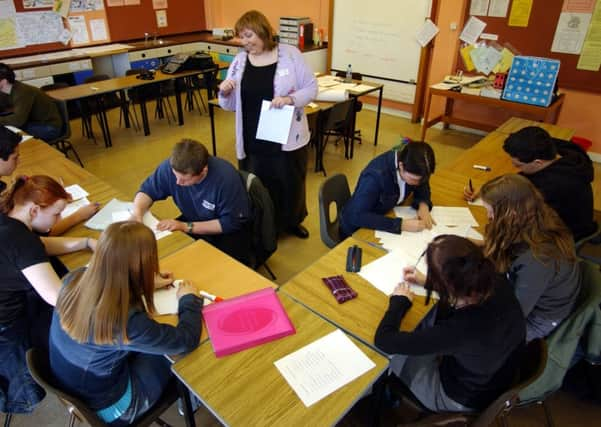State guardian scheme provokes further fury


Campaigners against SNP ministers’ controversial state-guardian scheme, to be rolled out in 2016, said they were outraged by the new guidelines on sexual health in schools, published yesterday, which follow the legalisation of same-sex marriage.
The scheme, which assigns a “named person” such as a teacher or health visitor to look out for the welfare of every child under 18, has been criticised as “unjustified interference” in private and family life. The role given to “named persons” in the new teaching guidelines – Conduct of Relationships, Sexual Health and Parenthood Education in Schools – further angered campaigners.
Advertisement
Hide AdAdvertisement
Hide AdThe guidance says that if a child discloses under-age sex has taken place, staff should discuss this with the child and ensure they have “access to confidential, young people friendly services” where appropriate.
The document then adds: “If there is judged to be a risk to the child’s well-being, staff should inform the child’s named person. In reaching a decision to share information or not, the views of the child or young person, so far as reasonably practicable, are to be ascertained and regarded.”
The implication that “named persons” would become involved before parents was criticised by the No To Named Person (NO2NP) campaign, which is fighting against state guardians through a judicial review.
A spokesman said: “It beggars belief a teacher with concerns about the well-being of a child – including under-age sexual activity, which is a serious criminal offence – should be told by the government to pass on those concerns to the named person and not the child’s parents.
“How can a professional with potentially hundreds of kids to keep an eye on be given priority over the people that care about children the most – their own parents?
“Parents aren’t mentioned at all in the entire section on confidentiality in this guidance. The government think the named person is entitled to know confidential, sexual health information about a child that its own parents are not.
“This is another example of the government undermining parents. The guidance’s empty platitudes about partnership between parents and schools are negated by the priority given to the named person’s role. What parent is going to feel they can co-operate with teachers if they know they will keep them in the dark about their child’s sexual activity but will share it with the named person?”
He added: “Mums and dads are being marginalised and sidestepped, their roles and responsibilities diminished and their authority undermined.”
Advertisement
Hide AdAdvertisement
Hide AdLiz Smith, the Conservative education spokeswoman, said: “I have huge problems with this. Parents will be very concerned that the first person who children will go to is the named person. Parents are being marginalised.”
However, the Scottish Government says the “named person” scheme has received the support of children’s charities and in a public consultation. A spokesman said: “The vast majority of children and young people get the support they need from within their families and wider communities.
“If concerns about a pupil are raised with the teacher who is their named person, they will respect the young person’s wishes for confidentially if possible, while encouraging them to seek whatever support is appropriate, including from their families.
“If a young person explicitly requests confidentiality, that view has to be respected unless there are concerns for their well-being, and a judgment on what specialised support, assistance or services are needed would be balanced against this request for privacy in each individual case.”
The guidelines – part of the Curriculum for Excellence – also say teachers should acknowledge same-sex relationships. It warns that “no school or individual teacher is under a duty to support, promote or endorse one type of relationship over another”.
The guidance states: “It is legal and permissible to discuss lesbian, gay and bisexual relationships in a positive manner within the school environment.” Parents who object to the curriculum have the right to withdraw their child if “alternative positive educational provision” can be provided.
But the government has said it will be impossible for children to be withdrawn from all lessons where sex and relationships will potentially be discussed.
The guidance says councils should consider the objections of any teacher who opposes the sex education programme, but the government said the programme should continue.
Advertisement
Hide AdAdvertisement
Hide AdDisabled children and those with learning difficulties should be given sex education to reflect research which found they are more than three times more likely to be abused, it says.
Teachers must be aware of the potential new technologies have to expose children to pornography, particularly “self-generated pornography” such as “sexting”.They must also balance the role of the internet in forming healthy relationships with the potential for online grooming and child sexual exploitation.
The government said it had “no intention of changing the current position where faith aspects of the curriculum in Catholic schools are determined by the Scottish Catholic Education Service on behalf of the Bishops’ Conference of Scotland.”
The Humanist Society of Scotland said this amounted to handing the Church “an effective veto” over sex education.